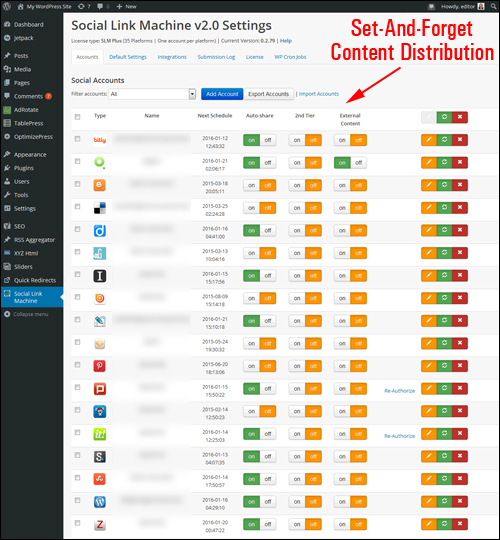 Welcome to Part 4 of our WordPress Website Traffic Blueprint article series, where we explain how to create an automated traffic machine using the WordPress CMS.
Welcome to Part 4 of our WordPress Website Traffic Blueprint article series, where we explain how to create an automated traffic machine using the WordPress CMS.
So far, here is what we have covered in this article series:
In Part One of this series, we describe the traffic automation process, and explain why using an expertly configured WordPress website or blog is the key to automating traffic to your website …
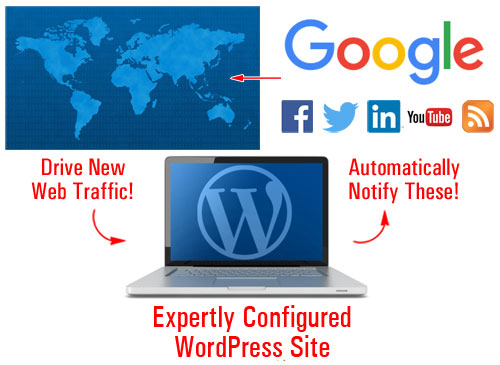
(With an expertly configured WordPress blog, all you have to do is add new content on a consistent basis to drive traffic!)
In Part 2, we focus on critical setup decisions. We explain the best way to get started if you don’t have a website yet, how to set everything up if you already have a website, and what to do if your existing site has been built with WordPress.
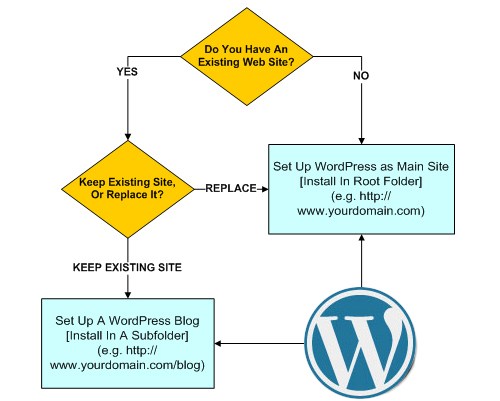
(In Part 2 we show you where to set up a WordPress website on your domain)
In Part Three, we discuss configuring WordPress.
Here, we configure all the settings that affect your website’s ability to generate traffic automatically …
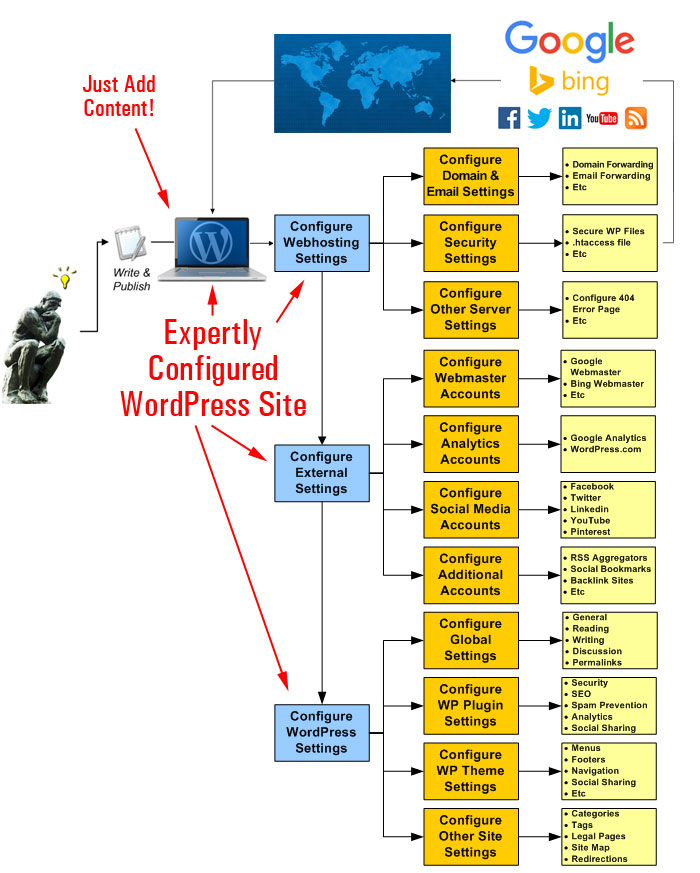
(In Part 3 you will configure all the settings that affect your site’s ability to generate traffic automatically)
In this section of the article series, we explain how to set up various plugins that can drive new traffic automatically to your site.
Why Automating The Traffic-Getting Process Makes Sense
Depending on which online marketing expert you get your advice from, you could find yourself trying to spend an hour or two per day (or more) posting content on social media in addition to trying to manage your business, your content and your online presence.
Many small business owners simply lack the time, human resources and financial means to employ the services of a full-time marketing department and engage in the kind of content marketing that many marketing experts advise doing. If you are spending hours checking Twitter, Facebook, and LinkedIn in addition to writing content for your blog or website, how can anything in your business get done?
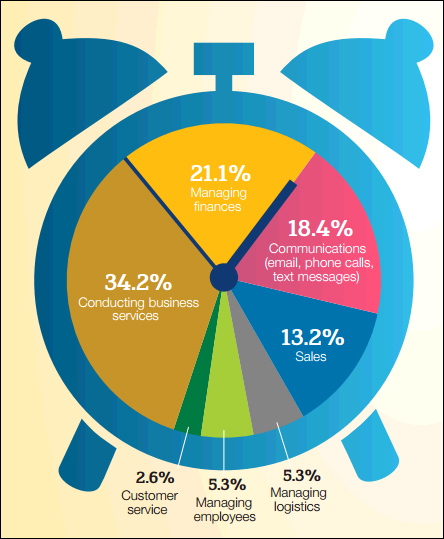
(Small businesses spend most of their time simply keeping their businesses up and running. Image source: National Federation Of Independent Businesses)
Small businesses spend most of their working hours keeping their businesses up and running. On top of this, there’s also sales and marketing. After all, businesses need to stay competitive and grow in order to survive.
A study of small businesses done by email and social media marketing company Vertical Response found that:
- Almost half of all businesses surveyed spent 6 or more hours per week on social media (the other half of businesses surveyed using social media spent even more time – between 6 and 21+ hours per week). This use of social media was a 66% increase from the previous year, so if the same research was done today, the numbers would most likely be significantly higher.
- More than half of all businesses surveyed spent 1-3 hours or more creating a blog post.
- Finding and posting content for social media was their most time-consuming online activity.
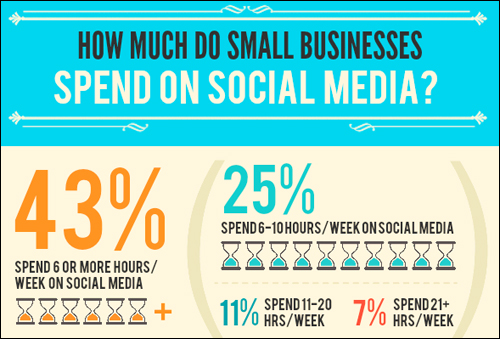
(Businesses are spending more time every year marketing and promoting themselves online. Infographic: VerticalResponse)
As small businesses spend more time promoting and marketing themselves online in order to compete and survive, this puts more and more pressure on businesses to focus their time on other important areas …

(Businesses with limited time, resources, and budget and many different business areas to focus on require careful planning of their marketing strategy.)
One other important thing to keep in mind is that, in addition to spending time social sites, you are investing all of your efforts into virtual real estate that you have no control over. You don’t own Twitter, Facebook, or LinkedIn. These companies can and will make decisions that impact your business without prior notification. Why invest so much effort and time building content on someone else’s real estate? With WordPress (self-hosted), you can control your own virtual real estate and distribute your content automatically to other websites.
Automating business processes to leverage time is nothing new. Businesses have been doing it ever since the Industrial Age. In the Digital Age, however, the increased availability of so many new channels for promoting and marketing a business creates a number of dilemmas for business owners, especially for those with limited time, marketing budgets, and resources. For example:
- Which of these channels should you invest more of your budget, time, and your efforts on?
- Should you invest so much time and effort building assets on sites that do not belong to you (e.g. Facebook, Twitter, Pinterest, etc.) while ignoring the benefits of building content on your own domain?
- Do you create new content for every channel you plan to include in your marketing strategy?
The Benefits Of Automating Your Traffic Generation Process With WordPress
What I’d like to share with you now, is a free, simple, and effective method that lets you automate your traffic-getting process with WordPress.
With this method, you will be able to:
- Save time creating content for your website or blog and other marketing channels (e.g. social media),
- Save money on content creation and unnecessary online marketing channels,
- Determine which channels you should focus more efforts, time, and budget on,
- Invest most of your efforts building your own asset instead of someone else’s and still benefit from other people’s marketing channels.
![]()
Many automated traffic solutions tend to focus on black hat methods, such as manipulating search engine results. This is not what the focus of this article series is about. In fact, we strongly urge you to avoid using black hat methods, tools, sites, and anything designed to “game” or violate the terms of service and policies of sites like Facebook, Google, Twitter, etc..

(Automating your web traffic does not require the use of black hat techniques!)
The purpose of this article series is to show you how to be smart with your limited resources and automate your content distribution so you can leverage your time and efforts, and increase your exposure online to sites that your target audience frequents.
An Automated Content Distribution, Traffic And Lead Generation, And Sales & Marketing System
As we’ve just seen in the previous section, many small businesses lack the time, resources and budget to engage in the kind of content marketing that most experts are prescribing. What you want to do, then, is be strategic with your limited resources, budget, and time.
So, instead of choosing this approach, which is very time-consuming …
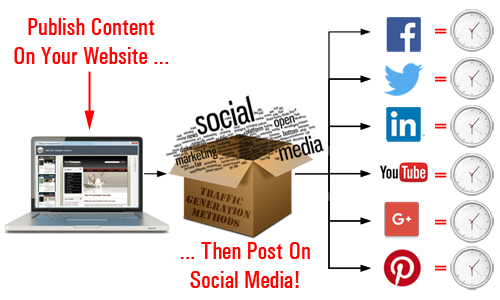
(Posting content to individual channels can be extremely time-consuming!)
Why not use this time-saving method instead …
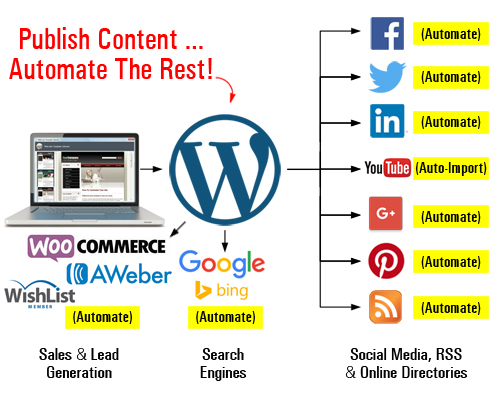
(Set up an automated content distribution, lead and traffic generation, and sales and marketing system with WordPress)
With an expertly configured WordPress site, you can build more than just a website for your business … you can set up an automated traffic and lead generation and sales & marketing system, where all you do is publish your content and WordPress then automates the rest.
With WordPress, you can publish content one-time, and automate the distribution of your content to all other services.
You can:
- Distribute content automatically to social services and bookmarking sites,
- Automatically distribute content (and comments) to other blogs and web properties using RSS
- Import content automatically (e.g. videos)
As your business evolves, you can add more functionality and automate processes like:
- Sell products and services with e-commerce,
- Capture leads with opt-in forms and add your subscribers to newsletters and autoresponders,
- Allow visitors to register on your site with different membership levels,
- And so much more!
You can do all of this using inexpensive WordPress plugins. Once these plugins are installed and configured on your site, just direct your visitors to the appropriate sections (e.g. your store, subscription forms, membership area, etc.)
How do you get all this done?
Simple … first, set up your site as explained in Part 2. Then, configure your site settings as described in Part 3. Once all of this is in place, you then automate your content distribution with plugins.
The video below shows you how everything works once your WordPress site has been expertly configured …
WordPress Traffic Automation Blueprint – Plugins
Let’s take a brief look at a number of traffic-generating WordPress plugins that can help to:
- Post content to social media sites and social bookmarking sites
- Distribute comments automatically to other blogs
- Distribute content to other online properties via RSS
Jetpack WordPress Plugin
You can get your posts automatically distributed to sites like Facebook, Twitter, Tumblr, LinkedIn, Google+ and more as soon as you publish new content using a WordPress plugin like JetPack.
Download URL: https://jetpack.com/
Jetpack is a free WordPress plugin with loads of useful features.
After Jetpack has been installed, you will need to connect the plugin to the WordPress.com account set up in Part Three …
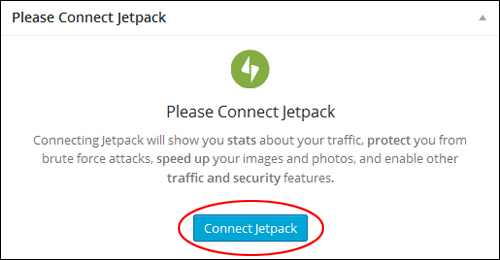
(Connect Jetpack to your WordPress.com account)
Next, activate the Publicize feature …
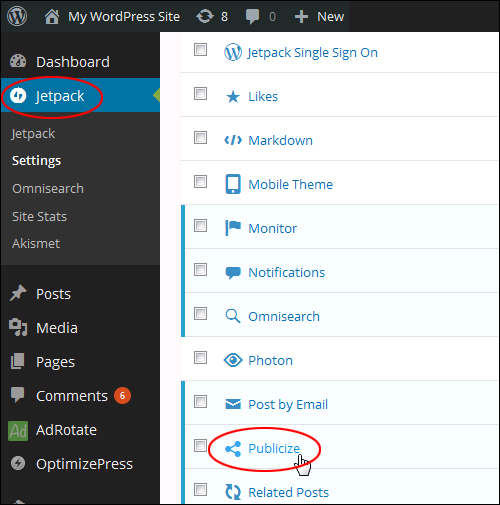
(Jetpack – Publicize feature)
Configure this section to automatically share your posts on Tumblr, Twitter, Facebook, GooglePlus, LinkedIn, and more …
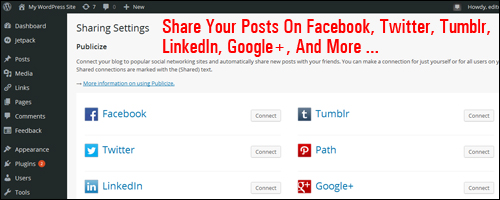
(Share your posts on various social accounts.)
After all account and plugin settings have been configured, your content is ready for distribution.
The Publicize feature adds a new section to your Publish box …
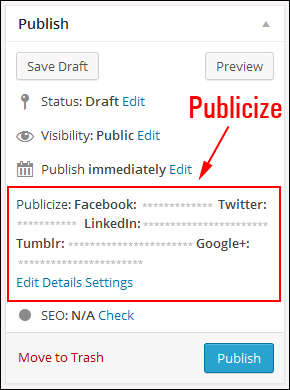
(Publicize account settings show in your Publish box.)
Now, as soon as you publish new content, it will automatically be shared on all of the accounts you have set up …
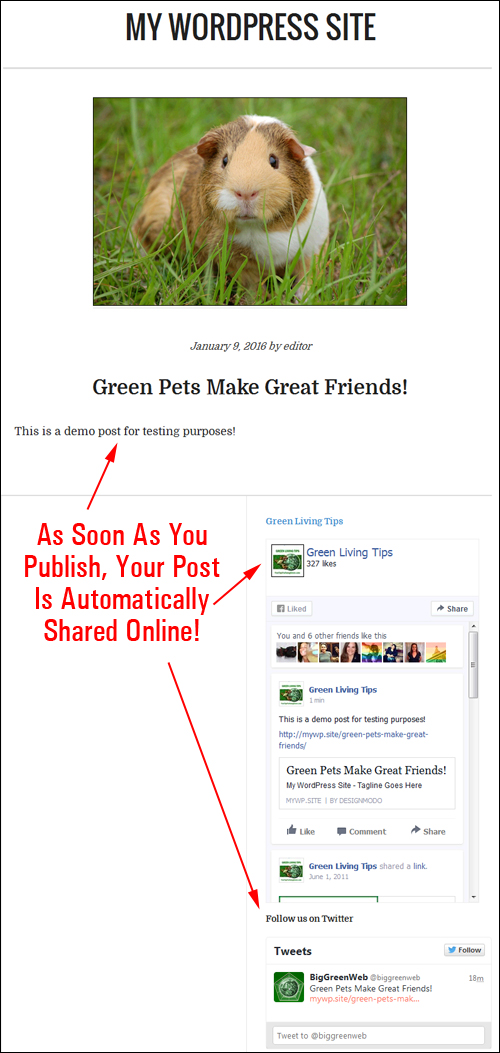
(As soon as you publish, your posts are automatically shared online.)
The Jetpack plugin provides you with a hands-free way to get more exposure for your content online on social media websites.
CommentLuv
(CommentLuv)
The WordPress commenting feature allows your blog readers to engage with your web site, post new comments, reply to existing comments and engage with your content as part of an online community.
You can enhance the WordPress default commenting feature using a 3rd-party plugin that integrates with social media, helping to share and spread them online.
For example, using a plugin like CommentLuv (Premium version) can help make your site more attractive to commenters by offering them a wider choice of backlinks if they like, tweet, or plus1 your post. This plugin will visit the site of the comment author while they are entering their comment and retrieve their most recent blog posts, which can be included with their comment after clicking the submit button.
(CommentLuv Pro version can attract more comments and traffic and improve user engagement on your website or blog.)
To learn more about the benefits of this great plugin, go here:
Social Link Machine
(SocialLinkMachine – Content distribution plugin for WordPress)
Social Link Machine is a WordPress plugin that lets you syndicate and drip-feed content, build anchor text backlinks, include relevant images and videos, and social signals on auto-pilot …
(SocialLinkMachine – drip-feed content automatically to many authority platforms)
With Social LinkMachine installed, you can automatically syndicate and drip-feed content to over 30 traffic-generating sites, including:
- Bookmarking Platforms: e.g. Bitly, Folkd, Kippt, Zotero, etc.
- Blogging Platforms: e.g. Livejournal, Overblog, Tribe, etc.
- Social Platforms: Google Plus, Xing, etc.
- Image Sharing Platforms: e.g. Flickr, etc.
- Document Sharing Platforms: e.g. Issuu, Sendspace, etc.
To learn more about the benefits of using this handy plugin, go here: Social LinkMachine
Also, if you would like to know more about setting up social media tracking (so you can get useful information about your content distribution efforts), we have written a detailed article on social media monitoring tools that are worth knowing about. You can learn more here:
![]()
The above are just a few examples of the many plugins that WordPress makes available for automating and syndicating the distribution of your content online.
Kickstart Your WordPress Traffic System
After your traffic automation system has been set up, we recommend kickstarting the process of driving traffic to your site with the steps shown in this tutorial:
WordPress Traffic Automation Blueprint: Automated Content Sharing Phase – Summary
Once your WordPress site and plugins have been expertly configured and set up, all you then have to do is post great content on a consistent basis to automatically bring traffic organically.
![]()
We have created an entire email training series aimed at helping you come up with limitless content ideas for your website:
Once you have configured your WordPress site, the next step is to optimize the process. This step is addressed in the next section of the series.
This is the end of Section Four
To keep reading this article, click here:

***
"I have used the tutorials to teach all of my clients and it has probably never been so easy for everyone to learn WordPress ... Now I don't need to buy all these very expensive video courses that often don't deliver what they promise." - Stefan Wendt, Internet Marketing Success Group
***





